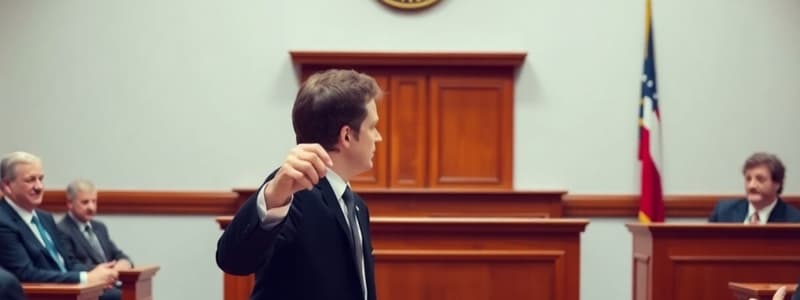Podcast
Questions and Answers
What is a common strategy attorneys use to elicit inconsistent answers from an officer?
What is a common strategy attorneys use to elicit inconsistent answers from an officer?
- Allowing long pauses before questions
- Changing the subject between questions
- Rephrasing the same question multiple times (correct)
- Asking the same question in the same wording repeatedly
How should an officer respond to a series of questions if they cannot recall the answer?
How should an officer respond to a series of questions if they cannot recall the answer?
- Always say 'I don't remember' for consistency
- Remain silent until prompted to answer
- Try to respond directly with a thoughtful answer (correct)
- Provide a different vague response to avoid appearing evasive
What should officers be cautious of when faced with a summary of their previous testimony by an attorney?
What should officers be cautious of when faced with a summary of their previous testimony by an attorney?
- The attorney may provide an accurate representation
- The summary will always align with their current position
- The attorney will avoid paraphrasing previous statements
- The attorney might misstate their earlier testimony (correct)
Which term refers to the preliminary examination of a witness or a juror by a judge or counsel?
Which term refers to the preliminary examination of a witness or a juror by a judge or counsel?
What tactic might an attorney use that involves asking a series of questions very quickly?
What tactic might an attorney use that involves asking a series of questions very quickly?
What is a common reason for officers to clarify their testimony during cross-examination?
What is a common reason for officers to clarify their testimony during cross-examination?
Why is it important for an officer to avoid agreeing with an attorney's misstate of their prior testimony?
Why is it important for an officer to avoid agreeing with an attorney's misstate of their prior testimony?
What can happen when attorneys use trick questions during cross-examination?
What can happen when attorneys use trick questions during cross-examination?
What should an officer do if they discover an error in their police report during cross-examination?
What should an officer do if they discover an error in their police report during cross-examination?
Why is it important for police reports to include all significant details?
Why is it important for police reports to include all significant details?
What is a common tactic used by defense attorneys during cross-examination?
What is a common tactic used by defense attorneys during cross-examination?
How should an officer respond to questioning about discussions with the prosecutor before testifying?
How should an officer respond to questioning about discussions with the prosecutor before testifying?
What is a potential consequence of trying to cover up mistakes in a police report?
What is a potential consequence of trying to cover up mistakes in a police report?
Why might an officer feel reluctant to admit a mistake in court?
Why might an officer feel reluctant to admit a mistake in court?
What is the primary purpose of a police report?
What is the primary purpose of a police report?
What action is advisable when an officer realizes they omitted vital information in their testimony?
What action is advisable when an officer realizes they omitted vital information in their testimony?
Flashcards
Undermining credibility with report discrepancies
Undermining credibility with report discrepancies
Defense attorneys often try to point out discrepancies between an officer's testimony and their police report in court. This is often done to undermine their credibility.
Handling Discrepancies in Testimony
Handling Discrepancies in Testimony
It's essential to be truthful and not become defensive when questioned about inconsistencies between reports and testimony. Admit mistakes and explain the purpose of the report concisely.
Purpose of a Police Report
Purpose of a Police Report
Police reports are intended to capture essential details, not to provide a comprehensive narrative of events.
The Importance of Complete Reports
The Importance of Complete Reports
Signup and view all the flashcards
Admitting Mistakes in Court
Admitting Mistakes in Court
Signup and view all the flashcards
Accusations of Coaching
Accusations of Coaching
Signup and view all the flashcards
Communicating with Prosecutors and Officers
Communicating with Prosecutors and Officers
Signup and view all the flashcards
Responding to Difficult Questions
Responding to Difficult Questions
Signup and view all the flashcards
Repetitive Questions
Repetitive Questions
Signup and view all the flashcards
Misquoting Prior Testimony
Misquoting Prior Testimony
Signup and view all the flashcards
Unreasonable Demand for "Yes" or "No" Answers
Unreasonable Demand for "Yes" or "No" Answers
Signup and view all the flashcards
Trick Questions
Trick Questions
Signup and view all the flashcards
Questioning Officer's Authority
Questioning Officer's Authority
Signup and view all the flashcards
Wrong Name, Wrong Rank
Wrong Name, Wrong Rank
Signup and view all the flashcards
Switching Testimony
Switching Testimony
Signup and view all the flashcards
Offensive or Rapid-fire Questions
Offensive or Rapid-fire Questions
Signup and view all the flashcards
Study Notes
Cross-Examination Tactics and Responses
- Discrepancies between Testimony and Reports: Defense attorneys often highlight differences between an officer's court testimony and their police report.
- Police Reports Limitations: Police reports are not intended to be comprehensive narratives. Officers may remember details not documented.
- Crucial Response: Don't become defensive. Admit errors or omissions in the report. Humility is better than cover-ups. Emphasize the report's purpose (establishing probable cause, charging).
- Example: If asked about a detail not in the report, explain the report's function: Briefly describe what happened, enough to get a case charged.
- Conversations with Prosecutors: Don't be defensive if questioned about talks with prosecutors or other officers. It's okay to talk with them and explain it. Saying "Yes" is acceptable, additional explanations are unnecessary.
- Inconsistent Questions: Attorneys might repeat questions with minor changes to elicit inconsistent answers. This is an attempt to get different answers to the same question, one being "yes" and the other "no."
- "I Don't Recall" Responses: Avoid "I don't recall" repeatedly. Instead, offer a more specific response, or articulate where your attention may not have been. For instance, 'I wasn't looking at that' is better than 'I don't recall.'
- Summarizing Previous Testimony: Be alert when attorneys summarize prior testimony, as they may misrepresent it. If a summary is incorrect, clearly state "That's not what I said." Don't assume a close summary is fine; listen carefully and don't just assume it's correct.
- Example of Misstatement: If an attorney falsely states, "You testified that you stopped my client because he was riding in a blue car," respond, "That's not what I said."
Common Cross-Examination Tactics
- Offensive/Rapid-Fire Questions: Potential tactic
- Condescending Counsel: Potential tactic
- Friendly Counsel: Potential tactic, although neutral.
- Badgering/Belligerent: Potential tactic
- Pretrial Discussions: Potential tactic
- Refusal to Discuss with Defense: Potential tactic
- Repetitive Questions: Potential tactic
- Voir Dire: Preliminary examination of witnesses or jurors.
- Advice on Constitutional Rights: A right of witnesses
- Multiple/Compound Questions: Potential tactic
- Misquoting Prior Testimony: A common tactic
- Unreasonable "Yes/No" Demands: A common tactic
- Trick Questions: Common tactic
- Questioning Officer's Authority: Common tactic
- Wrong Names/Ranks: Potential tactic
- Switching Testimony: Potential tactic
- Staring: Potential tactic
- Develop Conflicting Testimony: Potential tactic
- Prior Transcripts/Deposition Materials: Used to compare testimony against documentation.
Studying That Suits You
Use AI to generate personalized quizzes and flashcards to suit your learning preferences.




